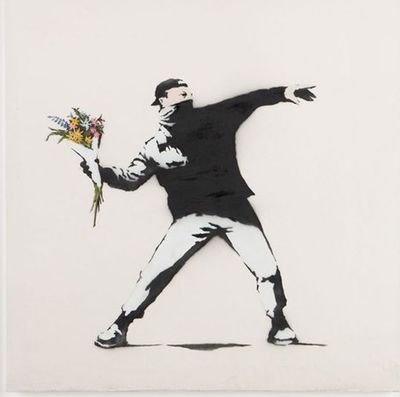
The street artist opened a pop-up shop in Croydon last year in a bid to protect his image rights, but was found to have “acted in bad faith”
Banksy has been stripped of the trademark of his famous Flower Thrower image after a panel of judges ruled he tried “to circumvent the law” by opening a pop-up shop in Croydon, south London last October in a bid to protect his intellectual property rights. The panel also said Banksy’s anonymity undermined his case.
The ruling, by the European Union Intellectual Property Office earlier this week, comes after a two-year legal battle with the card company Full Colour Black, which contested Banksy’s trademark rights to his own name and imagery. The legal dispute prompted Banksy to open the store, called Gross Domestic Product—“possibly the least poetic reason to ever hold an art show”, the Bristol street artist said at the time.
Following advice from his lawyer, Mark Stephens, Banksy filled the shop, which never actually opened, with items “created specifically to fulfill a particular trademark category under EU law”.
But Banksy and his legal team's reasoning backfired. As the judges put it: “By their own words they admit [it] was not genuine trade mark use in order to create or maintain a share of the market by commercializing goods, but only to circumvent the law.” Banksy had therefore “acted in bad faith”, the panel found.
Banksy first applied for an EU trademark of Flower Thrower in February 2014, 11 years after he first stenclled the image on a wall in Jerusalem in 2003. Three years later, in 2006, Flower Thrower appeared on the cover of Banksy’s book, Wall and Piece, in which the artist “positively extolls the virtue of disobedience to copyright and trade mark law”, the panel noted. As Banksy so succinctly put it: “copyright is for losers”. The artist also encouraged others to download his works for “amusement and activism”, but not for profit, according to webpages from 2010 and 2011 recovered by the panel.
Source: Anny Shaw
17th September 2020